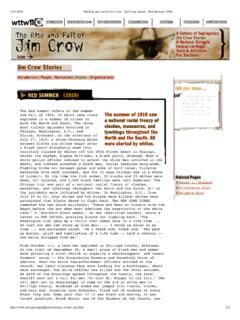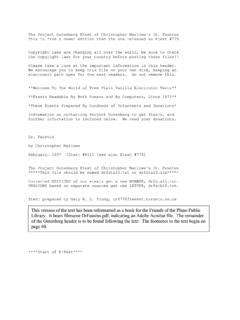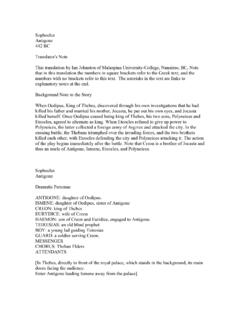Transcription of McKay on 'If We Must Die'
1 1/24/2016 McKay on & quot ; if we must die & quot ;. McKay on & quot ; if we must die & quot ;. Claude McKay Among my new poems there was a sonnet entitled & quot ; if we must die .& quot ; It was the most recent of all. Great events had occurred between the time when I had first met Frank Harris and my meeting with Max Eastman. The World War had ended. But its end was a signal for the outbreak of little wars between labor and capital and, like a plague breaking out in sore places, between colored folk and white. Our Negro newspapers were morbid, full of details of clashes between colored and white, murderous shootings and hangings. Traveling from city to city and unable to gauge the attitude and temper of each one, we Negro railroad men were nervous. We were less light-hearted. We did not separate from one another gaily to spend ourselves in speakeasies and gambling joints.
2 We stuck together, some of us armed, going from the railroad station to our quarters. We stayed in our quarters all through the dreary ominous nights, for we never knew what was going to happen. It was during those days that the sonnet, & quot ; if we must die ,& quot ; exploded out of me. And for it the Negro people unanimously hailed me as a poet. Indeed, that one grand outburst is their sole standard of appraising my poetry. It was the only poem I ever read to the members of my crew. They were all agitated. Even the fourth waiter - who was the giddiest and most irresponsible of the lot, with all his motives and gestures colored by a strangely acute form of satyriasis - even he actually cried. One, who was a believer in the Marcus Garvey Back-to-Africa Movement, suggested that I should go to Liberty Hall, the headquarters of the organization, and read the poem.
3 As I was not uplifted with his enthusiasm for the Garvey Movement, yet did not like to say so, I told him truthfully that I had no ambition to harangue a crowd. That afternoon with Max Eastman was spent in a critical estimation of my verse. He decided to publish a page of it. When I departed I left some of the verses but took with others the & quot ; if we must die & quot ; sonnet. I. wanted Frank Harris, whom I had not seen for many months, to see it. I had always remembered his criticism and rejection of & quot ;The Lynching,& quot ; and now I wanted to know if in & quot ; if we must die & quot ; I had & quot ;risen to the heights and stormed heaven,& quot ; as he had said I should. At that time Pearson's Magazine had its office in the same building as The Liberator. Frank Harris had me ushered in as soon as I was announced. & quot ;And where have you been and what doing all this time, my lad?
4 & quot ; he roared, fixing me with a lowering look. All his high exhibitionism could not conceal the frank friendliness and deep kindliness that were the best of him. & quot ;Now what have you done to be called a real poet, to join the ranks of the elect? Have you written a GREAT poem yet?& quot ; I produced & quot ; if we must die .& quot ;. He read it at once. Then he slapped his thigh and shouted, & quot ;Grand! Grand! You have done it. That is a great poem, authentic fire and blood; blood pouring from a bleeding heart. I shall be proud to publish it in Pearson's.& quot ;. I said that I was sorry, but the poem had already been accepted by The Liberator. & quot ;What? It belongs to me,& quot ; Frank Harris thundered. & quot ;The Liberator be damned! I gave you the inspiration to write that sonnet 1/4. 1/24/2016 McKay on & quot ; if we must die & quot ;. and I want to have the credit of publishing it.
5 In the next number of Pearson's. I'll play it up big.& quot ;. But I said I couldn't do that; I would have to ask Max Eastman's permission. & quot ;No, you won't,& quot ; roared Frank Harris. & quot ;Do you think I am the kind of man to accept a favor from Max Eastman? Why did you bring your poem here, after showing it to him?& quot ; Because I wanted him to see what I had done, I said, because I valued his opinion so highly, perhaps more than any other critic's, because his unforgettable words that memorable night of our first meeting were like a fire alive in me, because I so much desired to know if he considered what I had written as an achievement. I was excited and spoke quickly and earnestly. Frank Harris melted a little, for what I said had pleased him. But he was none the less angry. From A Long Way Home. [1937]. New York: Arno-New York Times, 1969.
6 Marcellus Blount Many of McKay 's published sonnets betray the terms of his search for an ideal racial self. He fixes his own dilemma in the context of the black man's insistent quest for racial authority. Feeling his own increasing burdens as a representative of the race in literature, he engenders himself as a black man who speaks for his race in general and to other black men in particular. His most famous sonnet, & quot ; if we must die ,& quot ; demonstrates the tension between racial and gendered utterances. The poem presents a traditional ideal of black masculinity: [quotes poem]. Written in 1919, in the wake of the Red Scare and the Red Summer of race riots throughout the urban centers of the United States, & quot ; if we must die & quot ; is McKay 's bold statement of a masculine, racial strategy. The nobility of his chosen form reaffirmed the conventions of dignity and the structures of address to which the poem's personae aspire.
7 Etched into the consciousness of literate black Americans for generations to come as a model of Afro-American heroism, this poem has become a point of reference for the entire racial experience and a touchstone of the Afro-American entry into subjectivity. As Winston Churchill used it as a rallying cry to call the British into sustained battle against the Nazis, this single poem of renunciation earned McKay an international reputation even beyond his race. While they speak for the entire race, the militant selves of the poem are in fact explicitly & quot ;male.& quot ; The phrase & quot ; if we must die & quot ; utters the poem's call to participation, and it gathers meaning through its repetition in the first and second quatrains. The phrase & quot ;O kinsmen!& quot ; makes that call to participation explicit; the poem's would-be warriors are men. McKay fails to explicate the unique position of women within this embattled black community, choosing instead to talk about the race by imagining the aspirations of black men.
8 The contest for black humanity in the poem is waged exclusively through the battle for black masculinity. Within the poem's rhetoric of pursuing honor and dignty, maleness is one of the spoils of the racial battle. In relation to white men, it is the ultimate mark of heroism. Whatever the position of women, for McKay this battle is between men. Following Dunbar's footsteps by placing Afro-Americans in the heroic sonnet, McKay is the first to represent a collective Afro-American self within the slender technical boundaries of the sonnet form. In & quot ; if we must die ,& quot ; McKay gives public voice to other black men who might speak privately for all black people. The poem enacts McKay 's powerful struggle for a masculine identity as a black writer in the midst of racial oppression. From the vantage point of his vocation as black writer, he turns to language to relieve the dissonance of his perception of what his life has become upon emigrating from Jamaica and his realization that his native culture of class distinction and apparent civility has ill prepared him for the viciousness of the racism that surrounded him daily.
9 In the poem, McKay ultimately retreats to the social 2/4.










